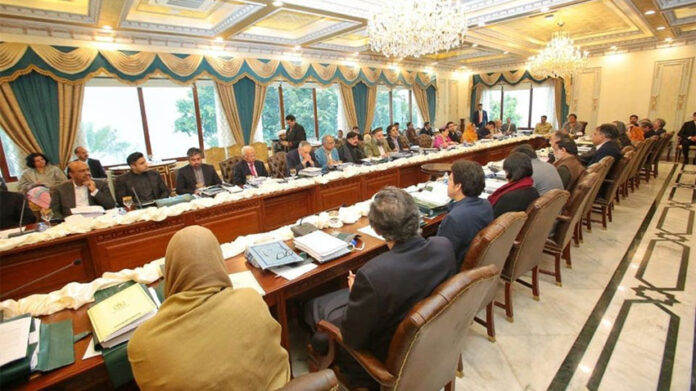–Federal cabinet bans sugar exports but allows imports to ensure a continuous supply in market
–Approves Rs490,000 Hajj package for pilgrims from north region, Rs480,000 for those from south region
ISLAMABAD: The federal cabinet on Tuesday approved a subsidy of Rs2 billion per month for a period of five months to Utility Stores Corporation (USC) for the provision of edible items of daily use to the people at affordable rates.
The meeting of the federal cabinet was held in the federal capital with Prime Minister Imran Khan in the chair.
During the meeting, Federal Minister for Science and Technology Fawad Chaudhry, Defence Minister Pervaiz Khattak and Minister of State for Parliamentary Affairs Ali Mohammad Khan opposed the establishment of new utility stores, saying the government should reduce petrol prices instead.
The prime minister also took Adviser for Commerce, Textile, Industry and Production and Investment Abdul Razzak Dawood to task over urea prices. He said that despite the abolition of Gas Infrastructure Development Cess (GIDC), urea prices had not been reduced. He directed the Commerce Ministry to ensure that farmers are provided fertilisers on reduced rates.
The global health emergency caused by the spread of the novel coronavirus, which originated in the Chinese city of Wuhan, also came under discussion during the meeting. The cabinet was briefed on the measures being taken by the health ministry to prevent the spread of the novel coronavirus as well as the situation of the Pakistani students currently trapped in Wuhan.
Later, briefing the media about the decisions taken during the cabinet meeting, Special Assistant to Prime Minister on Information and Broadcasting Dr Firdous Ashiq Awan said the relief package will help ensure availability of flour, sugar, rice and pulses among other edible items at USC outlets at reasonable rates. The USC has been further directed that 20 kg flour bag should be sold at Rs800 while pulses at 15-20 per cent lower prices than the market, she added.
Firdous also announced that the USC will issue ration cards before the holy month of Ramzan which would provide a discount of 25-30 per cent on essential items to deserving people.
She said that the government will open 2,000 “youth stores” in collaboration with USC.
“The stores will be part of the Kamyab Jawan Programme. The initiative will create jobs and ensure the provision of commodities at cheap prices. It will provide interest-free loans for the project,” she added.
She further said that USC will also open 12 cash-and-carry stores in major cities of the country to “stabilise prices”.
She said that the government will also devise a strategy to keep a check on the prices of essential edible items.
She said that the government’s economic team, Ministry of Commerce and other institutions, including USC, gave a detailed briefing to the prime minister.
“The cabinet gave the approval to lift the ban on import of sugar to ensure supply of this commodity,” she said, adding that the export of sugar has been banned and a strategy is being devised to remove regulatory duty on this commodity.
It is pertinent to mention here that this development comes a day after the Economic Coordination Committee’s (ECC) ratified PM Imran’s decision to slap a ban on the export of sugar in order to “stabilise domestic prices”. The ECC had not, however, approved the premier’s decision to import sugar through the private sector, noting that “adequate stocks” of the commodity are available in the country.
Firdous further said that 4.3 million women are being given Rs2,000 monthly under the Ehsaas programme. “The number will reach 70m by end of this year,” she added.
Minister for Religious Affair Noorul Haq Qadri, who addressed the media alongside Firdous, said that this year’s Hajj quota, so far, is 179,210 persons. He said that Saudi Arabia may increase the quota if there was more capacity.
He said that this year, 60 per cent of the pilgrims will be added in the government Hajj scheme, while 40pc will travel through private tour operators.
He also said that the Hajj policy had been delayed because the prime minister wanted to make sure that the pilgrimage as economically viable as possible.
“After much deliberation, the government had approved a package of Rs490,000 for pilgrims from the north region and Rs480,000 for those from south region,” he added.
The minister attributed the increased cost of Hajj to a rise in Pakistan International Airlines (PIA) airfares and devaluation of the currency.





[…] post Govt approves Rs10bn subsidy package to counter inflation appeared first on Profit by Pakistan […]